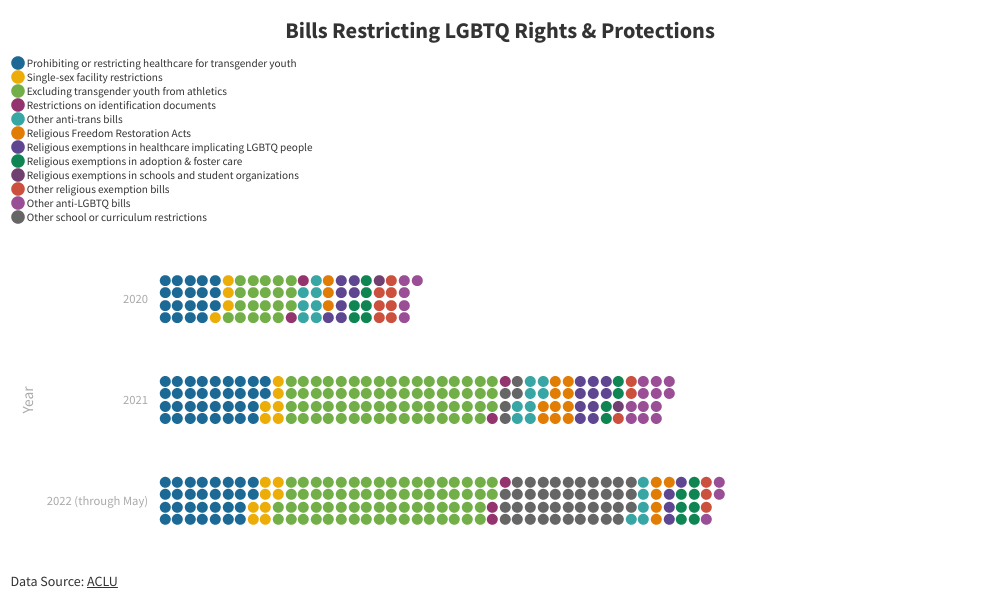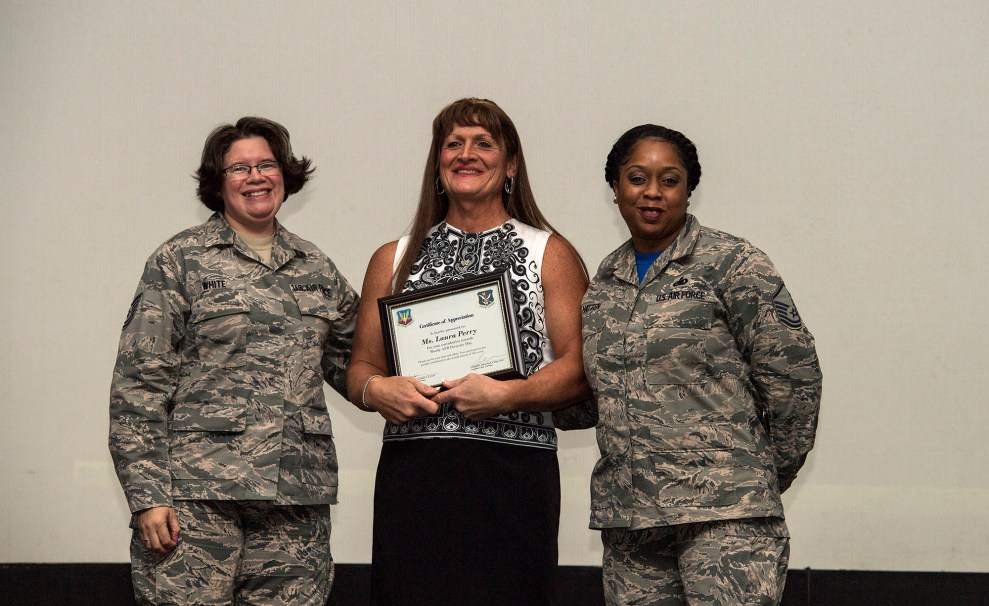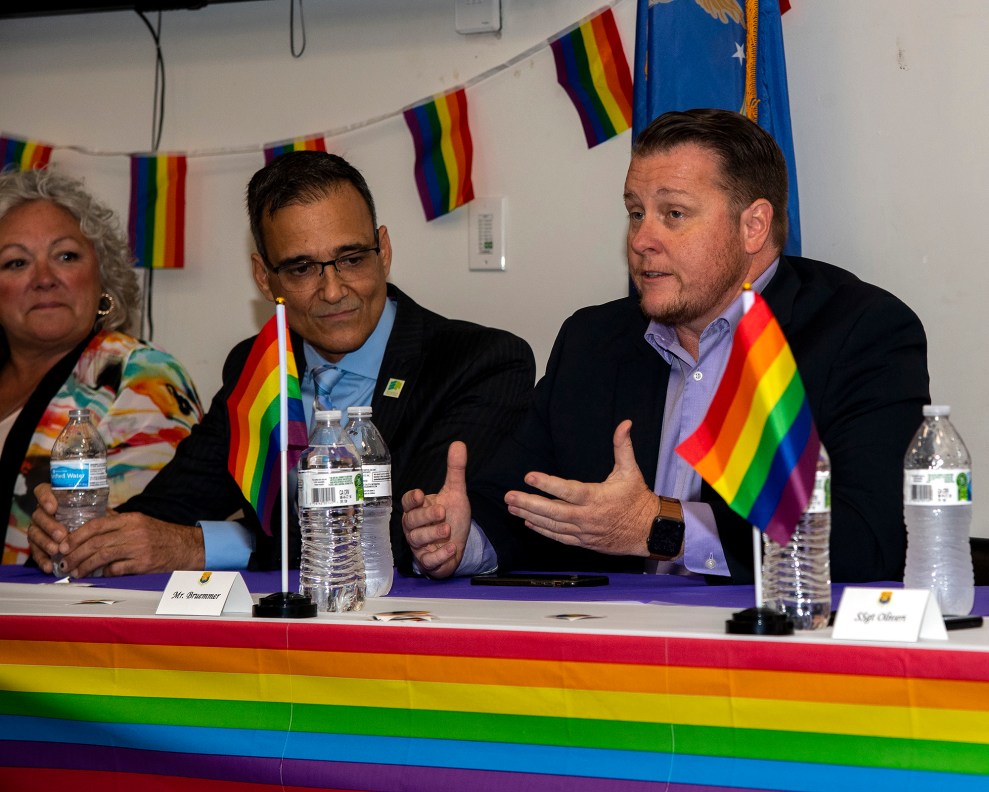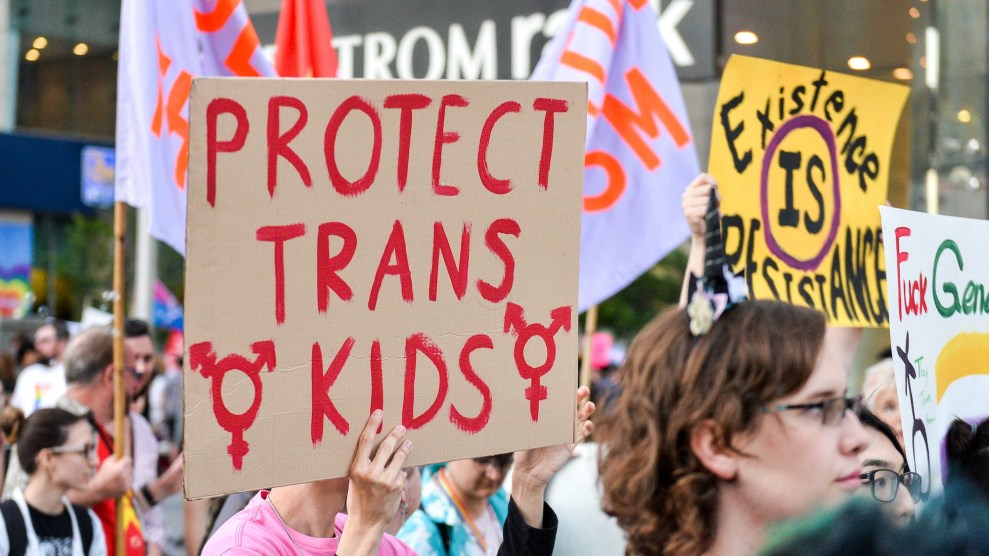
Soldiers and sailors pose together at Camp Lemonnier’s Thunderdome in Djibouti. The event was organized to talk about and recognize the lives of lesbian, gay, bisexual, and transgender individuals. Photo by Mass Communication Specialist 1st Class Randi Brown, courtesy of the U.S. Navy
This article first appeared on The War Horse, an award-winning nonprofit news organization educating the public on military service. Subscribe to their newsletter.
The first week after Staff Sgt. Alleria Stanley reported to Fort Leonard Wood in Missouri, she says, three separate people approached her to offer advice: For her own safety, she should avoid certain areas near base.
“‘Don’t go down these roads.’”
“‘Don’t go here.’”
“‘They’ll kill you,’” Stanley says she was warned by fellow servicemembers who thought she might be at risk—because she is transgender.
It reminded her of conversations she’d had while deployed. “That’s the briefing you would get in Afghanistan or Iraq,” says Stanley, who served in Afghanistan in 2005. “I got it in Missouri.”
Stanley came out in 2016, following then-Defense Secretary Ash Carter’s authorization of transgender troops in the military. She stayed on active duty after President Donald Trump largely reversed that policy. And she rejoiced when President Joe Biden reversed the reversal during his first week in office. But now, Stanley—who also has two transgender children—says the tidal wave of anti-LGBTQ legislation in states like Missouri is starting to make serving her country feel untenable.

Army Staff Sgt. Alleria Stanley.
Courtesy of Alleria Stanley
“You do not want to be assigned to a location which is hostile to your existence,” she says.
In Florida, a new law limits the discussion of gender identity and sexual orientation in schools. In Arizona, foster and adoption agencies can reject prospective LGBTQ parents because of their identity. In South Dakota, businesses can deny services to LGBTQ people under the auspices of religious freedom.
For the tens of thousands of LGBTQ people who serve in uniform, and the tens of thousands more who have gay or transgender children, these new state laws and policies have them rethinking their service. A poll by the Modern Military Association of America, the nation’s largest advocacy organization for LGBTQ service members and veterans, found that more than half of military families with LGBTQ children surveyed have altered their planned military service by declining orders, requesting transfers, or retiring early. While a spokesperson noted the sample size was small, she said the recent trend in state and local legislation is having an impact.
“The other statistic that’s undeniable is that a hundred percent of our members are worried about it,” says Cathy Marcello, who coordinates MilPride, the Modern Military Association of America’s program for families with LGBTQ children. “Everyone’s hoping that the next set of orders that pops up is not for Texas.”
While gay and transgender troops are allowed to serve openly, and many families with LGBTQ children find support and acceptance, they also say that can depend on location and whom they serve with. The realities of day-to-day life and the uncertainty over what might come next make planning for a career and family life difficult. And as the military branches scramble to design policies to support LGBTQ families, many service members worry that it won’t be enough.
“If you want to stay in the military, there’s certain places that you just need to serve,” says Becca Stewart, an Air Force spouse with an LGBTQ child living in Texas. “You don’t really know where to go, and you don’t really know who to trust.”
“They Did Not See Transgender Children”
So far this year, 39 states have introduced more than 265 bills that could negatively affect LGBTQ rights and protections, according to data from the bipartisan group Freedom for All Americans. That shatters last year’s record: In 2021, legislators across the country introduced a total of 191 such bills, according to an analysis by NBC News. This is a recent trend: In 2018, legislators introduced only 41 anti-LGBTQ bills in the entire country.
These bills span a variety of issues, including limiting discussion of LGBTQ issues in school curriculums, restricting bathroom facilities and school sports based on biological sex, exempting businesses from needing to provide certain services to LGBTQ people, and restricting health care for transgender youth, among other things. In Missouri, lawmakers are debating whether restrictions on gender-affirming care for transgender and nonbinary youth should apply to adults younger than 25 years old—which, Stanley points out, applies to active-duty servicemembers younger than 25.

Bills Restricting LGBTQ Rights & Protections, Sonner Kehrt/The War Horse
Data Source: ACLU
And then there are policies that don’t depend on lawmakers, like Texas Gov. Greg Abbott’s direction to the state’s Department of Protective and Family Services to investigate for child abuse parents who provide gender-affirming care to their trans children.
“This is something that will definitely need to be addressed, and it is going to become an issue for DOD when we have huge swaths of states where children are not safe or don’t have equal rights,” Marcello says. “And certainly it is a problem for DOD when you have military members who would be criminals in certain states.”
Officially, the Department of Defense is supportive of LGBTQ troops. Gay service members have been allowed to serve openly since the repeal of “don’t ask, don’t tell” 10 years ago. Transgender troops’ path to acceptance has been more fraught in recent years. In 2016, then-Secretary of Defense Ash Carter reversed a long-standing prohibition, paving the way for transgender military members to serve openly. But just over a year later, Trump surprised many in the Defense Department when he tweeted that he was reinstating the ban on trans troops. The official White House policy that followed ultimately created an exception for some trans service members who came out following Carter’s policy change, but for the most part, it once again barred transgender troops from serving. During his first week in office, President Biden signed an executive order reversing the ban.

Retired US Air Force Maj. Laura Perry, center, 45th Medical Operations Squadron master social worker, poses for a photo after a speaking engagement, Dec. 2, 2016, at Moody Air Force Base in Georgia. Perry spoke about her journey as a transgender veteran and what the opportunity to openly serve has given military members in this community as part of Moody’s Diversity Day celebrating LGBT Pride month.
US Air Force photo by Airman 1st Class Janiqua P. Robinson
The lack of more permanent protections makes transgender troops feel as though their careers hang in the balance of each coming election, advocates argue. And LGBTQ military families of all stripes, many say, navigate an exhausting, confusing patchwork of limited resources and unofficial policies that can be dependent on the branch of service, duty location, and individual health care providers and commanders, who have outsize influence on the culture at a base. That’s before taking into account the wave of anti-LGBTQ bills.
When Jessica Girven’s daughter, Blue, came out as transgender in 2016, the family lived in Germany, where Girven’s husband was stationed in the Air Force. Girven knew the Defense Department had recently published guidance stating that TRICARE, the military’s health care system, would cover gender-affirming care for transgender children on military bases. But when Girven and Blue went to see Blue’s longtime doctors on base, Girven says they refused to treat her—not just for care related to her transition, but for anything at all.
“We were informed that she could no longer be seen at that clinic because they did not see transgender children,” Girven says.
Girven tried to enroll Blue in the Air Force’s Exceptional Family Member Program, which permits families with specialized medical needs to request duty locations where they can receive care. But even though there was nothing in the program’s policy that prohibited parents from enrolling transgender children, the Air Force denied Girven’s request.
Ultimately, Girven went public with her family’s story and lobbied lawmakers for a change. Blue was able to enroll in the Air Force’s program, though legislative attempts to ensure affirming care for transgender military dependents have not passed. The family transferred to Maryland, where they found doctors who would treat Blue. But, Girven says, “it took nine congressmen, and the joint chiefs of staff, and so much congressional support to get our family to Maryland.”
“Just a Drop in the Bucket”
In April, the Air Force astonished many when it put out a brief statement that acknowledged the impact the wave of anti-LGBTQ legislation is having on Air Force families and highlighted resources, like the Exceptional Family Member Program, available to support them.
“We are closely tracking state laws and legislation to ensure we prepare for and mitigate effects to our Airmen, Guardians, and their families,” stated Under Secretary of the Air Force Gina Ortiz Jones in the announcement. “Medical, legal resources, and various assistance are available for those who need them.”
Many LGBTQ Air Force families welcomed the acknowledgment of the difficulties the legislation imposes. But it doesn’t do enough to support the realities of being an LGBTQ military family, some say.
“I really do appreciate that there was that support and there was that acknowledgment that it’s really difficult for military families with LGBTQ kids right now,” Stewart says. “But I think it’s just a drop in the bucket. It was basically an explanation of policies that are already in place to help military families. There wasn’t necessarily anything new in there.”

Nathan Bruemmer, board president and executive of St. Pete Pride, speaks at an LGBTQ+ Pride Month luncheon at MacDill Air Force Base, Florida, June 10, 2021. Bruemmer, a transgender man, was separated from the Army National Guard under “Don’t Ask, Don’t Tell” and now works as an LGBTQ+ consultant, educator, and advocate in the Tampa Bay area.
US Air Force photo by Senior Airman Ryan C. Grossklag
It’s unclear, for instance, how quickly Exceptional Family Member Program transfers will happen in practice and what “access to care” means. Not all transgender children have gender dysphoria, which is the medical condition under which transgender children are typically enrolled in the program, says Stewart, who works with many military families with LGBTQ children. Enrolling in the program might require outing a child. And, for many families, it’s not about access to care. A gay child, for instance, might not have any specialized medical needs—but if his family received orders to Florida, his school might not acknowledge his sexual orientation, under legislation passed earlier this spring. And the Air Force’s policies do nothing to explicitly support gay and transgender troops themselves.
So far, no other military branches have officially acknowledged the ongoing legislation or announced specific plans to support affected military members and families. Coast Guardsmen can discuss concerns with their command, and if there is a reasonable worry that troops or their families will face incidents “perceived as hostile, harassing, or discriminatory in nature,” the service may consider an alternate assignment, Coast Guard officials told The War Horse in a statement. Military.com has reported on a draft Army policy that would go much further than the Air Force’s guidance, effectively redefining its “compassionate reassignment” policy to accommodate soldiers who feel local or state laws discriminate against them because of “gender, sex, religion, race, or pregnancy.”
The Army would not confirm the draft policy to The War Horse or comment on whether other policies to support LGBTQ troops or families are under consideration.
“The Army does not comment on leaked, or draft documents,” an Army spokesman said in a statement to The War Horse, adding that soldiers may seek a compassionate reassignment under current rules. “The chain of command is responsible for ensuring soldiers and families’ needs are supported and maintain a high quality of life.”
But even if broader policy changes were under consideration, the logistical problems of implementation and the long-term implications on troops’ careers are unclear.
“There are certain duty stations you need to go to for career advancement,” Marcello says, referring to job assignments considered key for promotion. “There will be places that people will absolutely want to avoid. And it will hurt their careers.”
The Army’s Sergeants Major Academy, where senior noncommissioned officers train, is located at Fort Bliss, Texas. Enlisted medical personnel in every branch will likely need to rotate through Joint Base San Antonio, Texas, where the majority of medical training takes place. In fact, one of the few medical units in the military dedicated to serving transgender troops is in San Antonio. And many of the military’s largest bases are in the same states that are considering these bills.
Military families sometimes “geo-bachelor,” with the active-duty member taking orders somewhere while the rest of the family stays behind. It can be an expensive option, as families maintain two households, and a difficult one emotionally. But it comes up a lot when families discuss anti-LGBTQ legislation.
“We made a decision a long time ago that we won’t geo-bach,” says Samuel Castro, a master gunnery sergeant in the Marine Corps whose son Enrique came out to him as gay when the family was stationed in Texas. “That’s not in our genetic makeup as a family.”

Marine Corps Master Gunnery Sgt. Sam Castro, his wife, Liz, and their two sons, Enrique and Vicente.
Photo by Trish Alegre-Smith, courtesy of SoYourLife Photography
Instead, if he received orders to a state where he felt his son would feel unsafe, he would lobby hard for orders elsewhere—a lesson he tries to impart to the younger Marines he mentors, he says. “You do have a requirement to advocate for your family.” In turn, the military’s effectiveness depends on how well it supports families. “Military readiness and combat readiness is a direct derivative of family readiness,” he says.
“Service members should not have to choose between serving their country and protecting and serving their family,” his wife, Liz, adds.
“It affects national security.”
Last November, Alleria Stanley woke to find bullet holes in her car at her off-base home, she says. Strangers regularly take pictures of her when she’s out. She’s been followed and denied service at businesses.
On base, things are better, but support and resources are often hit or miss. For instance, while many military bases recognize Pride Month in June, no Pride events are planned this year at Fort Leonard Wood, she says. Pride flags remain banned on military bases, following a Trump-era policy. And just last month, the Air Force canceled a planned Pride Month event in Germany, for which Sen. Marco Rubio took credit.
“The underlying stigma in certain branches—it’s still there,” Liz Castro says. “Some people still have that mindset.”

US Air Force Tech. Sgt. Nykita Stoudemire, left, an Air Reserve Personnel Center reserve assignments technician, joins hands with her wife, Marissa, in Aurora, Colorado, June 21, 2018.
US Air Force photo by Senior Airman Jazmin Smith
The nature of military service means the extended network most people rely on during difficult times—longtime friends and neighbors, family nearby, a hometown community—doesn’t exist for many military families, her son Enrique says. Most military families change duty stations every three years, often transferring to different states or even different countries.
“I don’t have that support structure present,” Enrique says. “Every three years, it’s disrupted and removed.”
That’s why the military must demonstrate consistent support for LGBTQ military families, they argue.
But the issue extends to military readiness. While the LGBTQ legislation is one issue, Liz Castro says the repeal of Roe v. Wade could lead to a patchwork system where all sorts of rights protected on base do not extend off base in certain states—a concern echoed by some legal experts.
“If the homefront is not okay, then the service member cannot go forward and do their job,” Liz Castro says. “That affects national security.”
A recent National Military Family Association study found that 44% of military children follow their parents into the military. Children who don’t feel safe while their parents are in the military—or who see that their parents don’t feel safe—may be less likely to join, Marcello says. “It limits the pipelines to military service.”
For Jessica Girven’s family, safety is the most important thing, and she worries her daughter is no longer safe in a military family. “There’s a lot of this country that we won’t even drive through anymore,” she says.
Her husband will retire this summer. “We can’t run the risk of being sent somewhere where she doesn’t have the rights, where her health and education are at risk,” Girven says.
Stanley’s youngest child will graduate from high school this year, and Stanley herself has reached the end of her career—she’s also retiring.
“We’re at the end of it,” she says. “We are transitioning away from it, to borrow a term.” But if she weren’t already at retirement age, if her children were younger, she would be facing a similar choice.
“I spend every day talking and working with other families who’ve run into issues, and I don’t want that for my family,” she says. “And then to add on that, you’re not even safe at home. No. How could I ask that of my family?”
This War Horse investigation was reported by Sonner Kehrt, edited by Kelly Kennedy, fact-checked by Ben Kalin, and copy-edited by Mitchell Hansen-Dewar. Abbie Bennett wrote the headlines.








